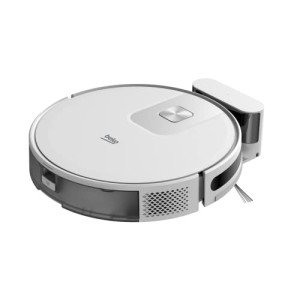10 Facts About Autonomous Vacuum That Make You Feel Instantly Good Mood
The Rise of Autonomous Vacuums: Revolutionizing Home Cleaning
In the age of technology, home tasks are becoming progressively automated, and one of the most notable improvements in this world is the autonomous vacuum. These intelligent cleaning robotics are developed to ease the drudgery of traditional vacuuming, making them popular amongst time-strapped homes. This post checks out the advancement, functionality, benefits, and limitations of autonomous vacuums, along with a contrast of a few of the leading models on the market today.
What is an Autonomous Vacuum?
An autonomous vacuum, also known as a robotic vacuum cleaner, is a little, automated gadget that browses through your home to clean floors without human intervention. Geared up with sensors, video cameras, and advanced software application, these vacuums can detect challenges, avoid stairs, and optimize cleaning courses. They generally run from a rechargeable battery, going back to their charging stations when their power is low or when cleaning tasks are finished.
Key Features of Autonomous Vacuums
Smart Navigation:
- Utilizes sensing units and algorithms to map the environment.
- Can navigate complex designs and prevent challenges.
Scheduling:
- Allows users to set cleaning times.
- Can operate when your home is empty, guaranteeing very little disturbance.
Connectivity:
- Many designs connect to Wi-Fi, permitting app control and combination with wise home systems.
- Users can personalize settings, check cleaning status, and receive notices through mobile applications.
Suction Power:
- Varies in between models; some offer adjustable suction settings for different floor types.
- High-end designs include effective suction capable of picking up pet hair and deep dirt.
Floor Type Adaptability:
- Capable of cleaning carpets, hardwood, tiles, and more.
- Particular models specialize in tailored cleaning for several surfaces.
The Advantages of Using Autonomous Vacuums
1. Time-Saving
Among the most considerable advantages of autonomous vacuums is the quantity of time they save. Instead of investing hours pushing a conventional vacuum, house owners can set robotic vacuums to clean while they are engaged in other activities.
2. Consistent Cleaning Schedule
With the ability to set up cleanings, these vacuums make sure that spaces are frequently tidied up, leading to a cleaner home in general. Routine cleaning assists keep indoor air quality, especially for families with allergies or asthma.
3. Smart Home Integration
Numerous autonomous vacuums can be integrated with wise home systems for seamless operation. robot vacuum can manage their vacuums by means of voice commands through devices like Amazon Alexa or Google Assistant, boosting user benefit.
4. Compact Design
The slim profile of these devices enables them to clean under furniture, such as sofas and beds, where standard vacuums typically can not reach.
5. Pet-Friendly
For animal owners, autonomous vacuums can be a game-changer, as they are typically geared up with specialized features for picking up animal hair and dander, contributing to a cleaner home environment.
Limitations of Autonomous Vacuums
Regardless of their lots of benefits, autonomous vacuums also have constraints:
1. Restricted Deep Cleaning
While these vacuums effectively maintain cleanliness, they may not change the efficiency of a deep tidy provided by standard vacuums, particularly for heavily soiled areas.
2. Capacity Constraints
Many autonomous vacuums featured little dust bins that need to be cleared frequently, particularly in bigger homes or homes with animals. This can be a trouble for some users.
3. Navigation Challenges
Although navigation innovation is continuously improving, some designs may have problem with specific layouts, particularly complicated areas with various obstacles or extremely small rooms.
4. Rate Point
While rates have become more available, high-end models can still be quite costly, posturing a barrier for some consumers.
Comparison of Top Autonomous Vacuum Models
Model
Smart Features
Battery Life
Suction Strength
Price Range
iRobot Roomba 980
App Control, Voice Assistant
120 minutes
1700 Pa
₤ 700 – ₤ 900
Roborock S6 MaxV
Advanced Mapping, Connectable
180 minutes
2500 Pa
₤ 600 – ₤ 800
Ecovacs Deebot Ozmo
Mopping, Smart Home
110 minutes
1500 Pa
₤ 450 – ₤ 700
Neato Botvac D7
Laser Navigation, Custom Zones
120 minutes
2000 Pa
₤ 800 – ₤ 900
Shark IQ Robot
Self-Emptying Base, Smart Map
90 minutes
1500 Pa
₤ 400 – ₤ 600
Notable Takeaways
- Smart Features: Consumers ought to prioritize models offering robust clever functions for convenience and efficiency.
- Battery Life: A longer battery life is beneficial for bigger living spaces.
- Suction Strength: Depending on household requirements, varying suction power can significantly affect cleaning effectiveness.
FAQs about Autonomous Vacuums
Q1: How do I keep my autonomous vacuum?
A: Regular upkeep includes cleaning the brushes, emptying the dustbin, and examining for blockages. Additionally, keeping the sensors clean up will help preserve navigation precision.
Q2: Can robotic vacuums clean rugs and carpets?
A: Yes, many robotic vacuums are designed to successfully tidy both difficult surface areas and carpets. However, suction power may differ based on the model.
Q3: Do robotic vacuums need Wi-Fi?
A: While numerous autonomous vacuums take advantage of Wi-Fi connection for app control and updates, some designs can operate separately without a cordless connection.
Q4: How frequently should I run my robotic vacuum?
A: It depends upon your living scenario, but running it numerous times a week is typically recommended, specifically for homes with animals.
In conclusion, autonomous vacuums represent a considerable development in home cleaning innovation, appealing convenience and performance. While these gadgets may not totally change traditional vacuum cleaners, they are certainly useful in keeping a tidy living environment. As technology continues to progress, the future of home cleaning looks appealing, and these gadgets are at the forefront of the revolution.
